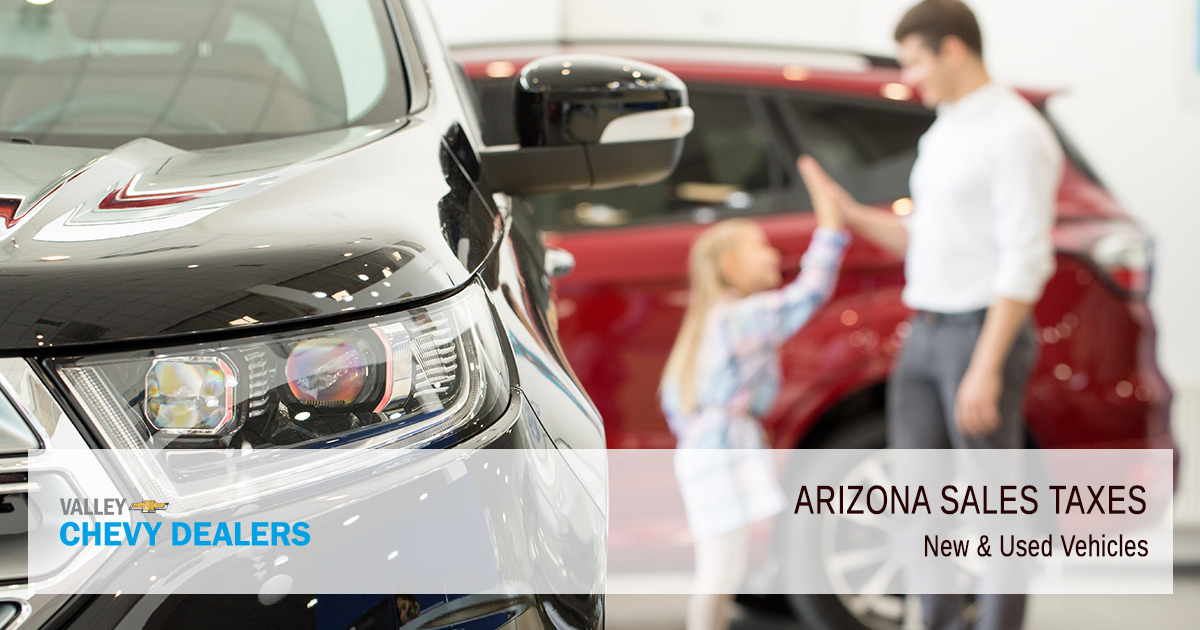Arizona Sales Tax on Cars

Updated: 12 June 2021
The advantages of owning a vehicle are not limited to the convenience of on-demand transportation. With a car, you have the freedom to take more vacations or commute from wherever you like. You also have the ability to transport large items, such as furniture or bulk grocery purchases. The ease of owning a car is clear; the process of buying one can sometimes be confusing.
Though many car shoppers take the time to research the type of vehicle they’re looking to buy, many don’t consider the logistics of the sale until they’re in the thick of it. One key aspect that is often overlooked is the Arizona sales tax on cars.
Just like any purchase you make in a retail setting, you are responsible for paying a sales tax. Because this figure is calculated as a percentage of the full price, the amount is greater on more expensive items. With cars, this can be a substantial number. When establishing your vehicle budget, it’s necessary to factor this in with all other expenses.
Car Purchase Expenses
If you’re preparing to buy a car, you may have set aside a specific amount for your down payment. Typically, this is about 20% of the full purchase price. However, you will spend more than this initial percentage, so it is crucial that you save much more than you need for a down payment.
Consider that once you acknowledge the other costs, you might have to reduce the total you put down in order to cover these added expenses. Paying less upfront results in a larger loan; the longer you carry that debt, the more you end up spending on interest.
To keep your down payment where you want it, it’s important to factor in sales tax when determining your budget and choosing your car. If you don’t currently have a vehicle, don’t forget that you will have to pay registration fees and insurance premiums. These may sneak up on you if you’re not used to budgeting for them.
Average Sales Tax in Arizona
In most states, including Arizona, sales tax rates on automobiles are decided at both the state and county level. The state puts forth a base rate, while each county sets its own additional percentage. The state rate is added to the county rate to get the total sales tax percentage for that particular transaction. The county rate that’s applied depends on where the purchase is made.
The state sales tax rate may change at any time. Arizona last updated this percentage in 2013, when it was reduced from 6.6% to the current rate of 5.6%. In comparison to other states, Arizona ranks somewhere in the middle.
Although you may be using auto financing to cover a large portion of the purchase, you still must pay the sales tax on the full price of the car. The only exception is if you have a trade-in or rebate value that is deducted.
City and County Additions
As of 2020, the current county sales tax rates range from 0.25% to 2%. When combined with the state rate, each county holds the following total sales tax:
-
-
- Apache County – 6.1 percent
- Maricopa County – 6.3 percent
- Cochise County – 6.1 percent
- Pinal County – 7.2 percent
- Gila County – 6.6 percent
- Greenlee County – 6.1 percent
- Pima County – 6.1 percent
- La Paz County – 7.6 percent
- Coconino County – 6.9 percent
- Santa Cruz County – 6.6 percent
- Mohave County – 5.85 percent
- Yavapai County – 6.35 percent
- Graham County – 6.6 percent
- Navajo County – 6.1 percent
- Yuma County – 6.712 percent
-
If you’re looking for an Arizona car tax calculator, you can find the figure yourself with some basic calculations. Once you have a budget in mind, multiply that number times the decimal conversion of the sales tax percentage in your municipality. This will give you the sales tax you should expect to pay.
For example, if your budget for your next car is $15,000, and you make your purchase in Apache County, you would pay about $915 in sales tax (15,000 x .061).
Tax on New Cars vs. Used Cars
Many car shoppers face a dilemma when it comes time to replace their old car: should you invest in a factory new model or enjoy the cost savings of a pre-owned vehicle? If you’re wondering how the potential sales tax factors into this decision, rest assured that there is no added tax just because it’s a new car. However, keep in mind that you may still spend more.
Although there isn’t a difference in how sales tax is calculated for new and used cars, you’ll more than likely pay much more in taxes if you opt for a new model. Because sales tax is a percentage, it raises with the value of your purchase. The average cost of a used car in today’s market is just under $20,000. This is due in large part to the newer condition of most pre-owned vehicles. For comparison, you may spend around $34,000 on a brand-new vehicle.
There are many pros and cons when it comes to choosing between a new or pre-owned vehicle. The amount in sales tax does go up as the purchase price increases, but you can factor the extra cost into your budget if you plan ahead well. You shouldn’t let the sales tax affect whether you buy new or used.
How can a Trade-in Vehicle Reduce my Taxes
No matter how new or old your next vehicle ends up being, one advantage that you’ll have is the ability to cash in on your previous car. By trading in your old one, you can get a significant reduction off the full purchase price of your new car. This can sometimes make a huge difference if you want to upgrade to a much more recent model.
The good news in this situation is that you only pay sales tax on the full purchase price minus the value of your trade-in. If you’re able to get $5,000 for your old car, and you replace it with a model that is $20,000, you would only have to pay the sales tax on $15,000.
How much your trade-in is worth depends on several criteria. The first thing to consider is the Kelley Blue Book value, which does not take into account the car’s maintenance and repair history, nor does it include the mileage. These considerations are specific to your vehicle and must be evaluated on a case-by-case basis.
One thing to keep in mind is that regardless of the car’s pristine condition, you likely will not receive the full Kelley Blue Book value. Regardless, it’s still well worth it to cash in your old car and put the money towards a new one.
Like trade-in vehicles, you are not responsible for the sales tax of the full purchase price if you receive a rebate. This amount is deducted from the cost, and you are only taxed on the remaining value.
Taxes for Out-of-State Car Buyers
In pursuit of the best deal, it’s not uncommon to look outside of the state you currently reside to find the perfect car. Some dealers in your region may not have what you’re looking for, or you might be on the hunt for a very specific model. Regardless of your reasons, it’s important to understand auto sales tax for non-residents; it can get a bit confusing if you’re unfamiliar with how it works.
In order to properly address the sales tax, you’ll first have to prove residency in whatever state you’ll be registering the car in. In most cases, what you pay in sales tax in Arizona is delivered to the state where you live. However, there are exceptions based on the tax rate of your home state.
To understand how this is done, it’s best to start by looking at the four possible scenarios you may run into when purchasing your car in Arizona. You should fall into one of the following categories:
-
-
- You live in a state where no sales tax is imposed.
- You live in a state where the sales tax is less than 5.6%.
- You live in a state where the sales tax is greater than 5.6%.
- You live in a state that does not have tax reciprocity with Arizona.
-
There are five states that do not have a sales tax. Arizona provides an exemption if you plan to register the car in one of these states, meaning you will not have to pay a sales tax, even if the transaction occurs in Arizona.
For states that have a tax rate that is less than Arizona’s 5.6%, tax is collected by the state of Arizona at the time of purchase. The rate imposed is equal to the state rate where the car will be registered.
When the sales tax is greater than 5.6%, you pay this percentage at the time of purchase. Then, when you register the car in your state of residency, you may be asked to pay an additional percentage to cover the sales tax difference between the two states.
There are eight states that do not have reciprocity, meaning the state of Arizona cannot forward any taxes paid at the time of purchase. Buyers are exempt from Arizona taxes in these situations but must pay the state’s sales tax when the car is registered.
Additional sales tax exemptions may apply in your unique situation. Examples include military personnel, Native Americans, and disabled individuals. You can ask your local Chevy dealer about potential exemptions as you work through the details of your purchase.
Auto Budget Considerations
The sales tax on your new vehicle may be significant, but it doesn’t have to catch you completely off guard. By doing your research ahead of time, you’ll know what to expect and you can budget accordingly. You might opt for a less expensive car, or you may also decide to save up for a little longer to get the vehicle you really want.
In doing your calculations, don’t forget to consider your potential loan amount. It’s this figure that determines your monthly payment. You may wish to compile a larger down payment to reduce the size of your loan, while still making sure you have enough to cover the cost of the sales tax.
Smart Purchase Decision
Now that you understand the basics of auto sales tax, you are better prepared to buy the car of your dreams. Start by considering your unique situation and shop for a vehicle that fits your specific needs. For cars in the Phoenix metro area, you can browse the inventory of a Chevy dealer near you to begin the search.
Let your local Valley Chevy dealer help you find the perfect car. A dedicated team can walk you through the purchase process from start to finish. If you have any other questions about Arizona vehicle sales tax, reach out today and get the answers you need.


